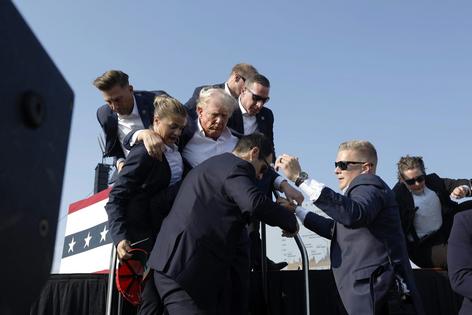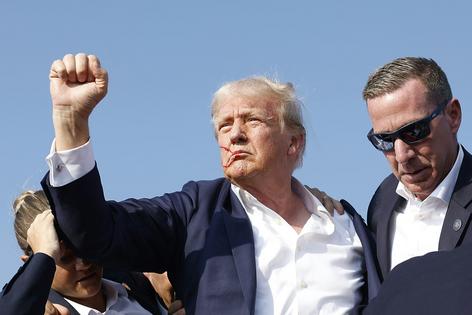‘One inch from a potential civil war’ – near miss in Trump shooting is also a close call for American democracy
Published in Political News
With an assassination attempt on Donald Trump at a rally in Pennsylvania on July 13, 2024, the U.S. experienced another violent episode in its increasingly polarized politics. Former President Trump, who’s about to formally become the GOP nominee for president in the 2024 election, survived the attempted assassination when, initial reports said, a bullet grazed his ear. But one rally attendee was killed, more spectators were injured and the suspected gunman is also dead. The Conversation’s politics editor, Naomi Schalit, spoke with University of Massachusetts, Lowell, scholar Arie Perliger after the event. Perliger offered insight from his study of political violence and assassinations. Given the stark political polarization in the U.S., Perliger said, “it’s not a surprise that eventually people engage in violence.”
Schalit: When you heard the news, what was the first thing you thought?
Perliger: The first thing that I thought about is that we were basically one inch from a potential civil war. I think that if, indeed, Donald Trump would have suffered fatal injuries today, the level of violence that we witnessed so far will be nothing in comparison to what would have happened in the next couple of months. I think that would have unleashed a new level of anger, frustration, resentment, hostility that we haven’t seen for many, many years in the U.S.
This assassination attempt, at least at this early stage, may validate a strong sense among many Trump supporters and many people on the far right that they are being delegitimized, that they are on the defensive and that there are efforts to basically prevent them from a competing in the political process and prevent Trump from returning to the White House.
What we’ve just seen, for many of the people on the far right, fits very well into a narrative that they’ve already been constructing and disseminating for the last few months.
Political assassination attempts don’t aim only to kill someone. They have a larger goal, don’t they?
In many ways, assassination attempts bypass the long process of trying to downgrade and defeat political opponents, when there is a sense that even a long political struggle will not be sufficient. Many perpetrators see assassinations as a tool that will allow them to achieve their political objectives in a very quick, very effective way that doesn’t demand a lot of resources or a lot of organization. If we are trying to connect it to what we’ve seen today, I think that many people see Trump as a unicorn, as a unique entity, who in many ways really consumed the entire conservative movement. So by removing him, there’s a sense that that will or may solve the problem.
I think that the conservative movement changed dramatically since 2016, when Trump was first elected, and a lot of the characteristics of Trumpism are actually now fairly popular in different parts of the conservative movement. So even if Trump will decide to retire at some point, I don’t think that Trumpism – as a set of populist ideas – will disappear from the GOP. But I can definitely understand why people who see that as a threat will feel that removing Trump can solve all the problems.
In a study of the causes and impacts of political assassination, you wrote that unless electoral processes can address “the most intense political grievances … electoral competition has the potential to instigate further violence, including the assassinations of political figures.” Is that what you saw in this attempted assassination?
Democracy cannot work if the different parties, the different movements, are not willing to work together on some issues. Democracy works when multiple groups are willing to reach some kind of consensus through negotiations, to collaborate and to cooperate.
What we’ve seen in the last 17 years, basically since 2008 and the rise of the Tea Party movement, is that there’s increasing polarization in the U.S. And the worst part of this polarization is that the American political system became dysfunctional in the sense that we are forcing out any politicians and policymakers who are interested in collaboration with the other side. That’s one thing. Second, people delegitimize leaders who are willing to collaborate with the other side, hence, presenting them as individuals who betrayed their values and political party. And The third part is that people are delegitimizing their political rivals. They transform a political disagreement into a war in which there is no space for working together to address the challenges they agree are facing the nation.
When you combine those three dynamics, you create basically a dysfunctional system where both sides are convinced that it’s a zero-sum game, that it’s the end of the country. It’s the end of democracy if the other side wins. If both sides are hammering into people again and again that losing an election is the end of the world, then it’s not a surprise that eventually people are willing to take the law into their hands and to engage in violence.
This article is republished from The Conversation, a nonprofit, independent news organization bringing you facts and trustworthy analysis to help you make sense of our complex world. It was written by: Arie Perliger, UMass Lowell
Read more:
Violence has long been a feature of American elections
Despite threats of violence, Trump’s federal indictment happened with little fanfare – but that doesn’t mean the far-right movement is fading, an extremism scholar explains
Election violence in November? Here’s what the research says
Arie Perliger does not work for, consult, own shares in or receive funding from any company or organization that would benefit from this article, and has disclosed no relevant affiliations beyond their academic appointment.
































































Comments